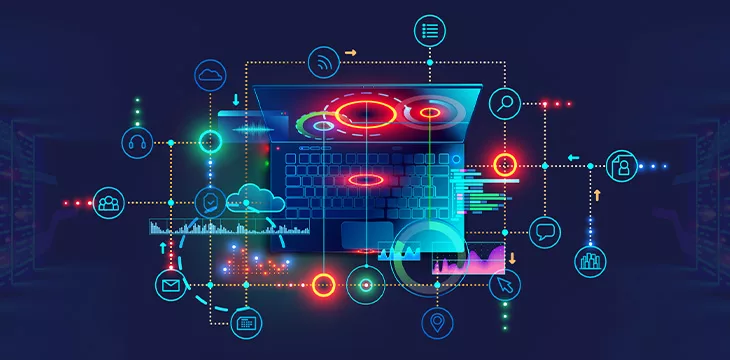Most people think the internet is a vast virtual space where anyone can establish their online presence anytime. However, IPv4—the current IP used by millions worldwide—is reaching its endpoint. In addition, the emergence of many internet of things (IoT) devices worldwide has made IPv4 addresses scarce.
Good thing, IPv6 is here to save the day. This latest IP version has a more vast and expansive address space that allows anyone to create new addresses without worrying about security and privacy. This capability is similar to blockchain’s infrastructure. When you combine both technologies, the possibilities for private addresses are endless.
However, before going there, it’s important to understand the root of these innovations. What is IPv6, and what are its uses? How does it differ from IPv4? Know the answers to these questions in the infographic below.

What is IPv6?
IPv6 is the latest internet protocol (IP) version. It uses a 128-bit addressing scheme to support approximately 340 undecillion addresses. The Internet Engineering Task Force (IETF) developed this IP version in 1998 to address IPv4 address exhaustion. The depletion of IPv4 addresses resulted from growing internet users and the rising usage rate of digital devices.
In June 2012, major ISPs, home networking equipment manufacturers, and web companies permanently enabled IPv6 for their products and services. As of October 2022, the global IPv6 adoption rate is at 40.86%, with France, India, and Germany having the highest rates among other countries.
Unlike its predecessor, IPv6 no longer requires network address translation (NAT), meaning it won’t need to group multiple local private addresses behind a public one. Its other unique features and benefits include auto-configuration, better multicast routing, simpler header format, routing, and administration, built-in authentication and privacy support, and flexible options and extensions.
IPv4 vs. IPv6: How Do They Differ?
IPv6 has distinct qualities that IPv4 lacks, making the former the perfect IP version for the modern world. Here are the key differences you should know.
1. Address
When the U.S. Department of Defense created IPv4 in 1980, they believed that a 32-bits space and 4.3 billion IP addresses were enough for all computers worldwide. What started as an “experiment” eventually became a widely used internet protocol.
However, IPv4’s 32-bit space couldn’t meet the growing demand for IP addresses when the internet became popular by the day.
As such, the IETF developed IPv6 a few years later with a 128-bit space that accommodates 340 undecillion IP addresses.
An IPv4 address follows an x.x.x.x format where the x octet is a decimal value between 0 and 255. Meanwhile, an IPv6 address follows a y:y:y:y:y:y:y:y format where the y segment can be any hexadecimal value between 0 and FFFF. In addition, IPv4 address octets are separated with a period, while IPv6 address segments are separated with a colon.
2. Connectivity
With IPv4 addresses now nearly depleted, ISPs struggle to offer globally routable IP addresses. NAT also slows down the rate of assigning IP addresses. While this capability is a security benefit, it’s a connectivity disadvantage for people requiring fast network processing.
Meanwhile, IPv6’s 128-bit space ensures enough IP addresses for all devices for years. As a result, every computer, mobile device, laptop, server, and website can have a unique IP address and connect to the internet without NATs. IPv6 also allows every host to connect directly with multiple other hosts online via multicast addresses so that media streams etc. can reach many destinations simultaneously.
Additionally, IPv6 is designed for autoconfiguration, while IPv4 still requires manual or assisted configuration using dynamic host configuration protocol (DHCP). The autoconfiguration feature Stateless Address Auto-Configuration or SLAAC is available for all devices with an IPv6 address.
3. Security
End-to-end encryption and integrity-checking features like IP security (IPsec) are built into IPv6, which are only add-on options to IPv4. IPsec makes data consistent and enhances security and confidentiality in different networks. These features make IPv6 and blockchain perfect for each other, with the latter also relying on cryptography to secure transactions.
Additionally, IPv6 uses the neighbor discovery protocol (NDP) and its extension, the secure neighbor discovery (SEND) protocol. The NDP allows different nodes on the same link to learn about and promote their neighbors’ existence. Meanwhile, the SEND protocol uses various security tools to prevent or counter threats to NDP.
4. Transactions
While IPv4 allows IP-to-IP transactions, it has security and capacity flaws that make it difficult to process blockchain transactions. NATs used for IPv4 addresses hinder people and devices from communicating with each other. That’s why BTC Core developers removed the IP-to-IP functionality from the blockchain protocol in 2011.
IPv6 aims to resolve this challenge with improved security and connectivity features.
The prevalence of IPv6 adoption will unlock the original blockchain protocol’s full potential and create an end-to-end data and payment communication model. IPv6’s ability to provide an IP address for every device worldwide is key to expanding the blockchain’s role as a peer-to-peer payment and data transaction system.
BSV Blockchain plans to accommodate the blockchain community with IPv6 by mandating the use of IPsec with the new protocol. This feature can make blockchain transactions over IPv6 possible and more secure than ever.
5. Privacy
Due to its encryption features, IPv6 can bind a public signature key to an IP address, creating a cryptographically generated address (CGA). This address allows users to confirm their identity and establish ownership over that address. Unfortunately, the CGA feature isn’t possible in IPv4 due to its limited 32-bit address space.
IPv6’s public keys feature is similar to that used in blockchain transactions. While these transactions are publicly recorded on the blockchain, the underlying technology only links transactions to wallet addresses, leaving users anonymous. You only need to provide your personal information for Know Your Customer (KYC) purposes, but it won’t be revealed in the blockchain.
Blockchain transactions also require public and private keys to verify senders and receivers.
How Blockchain Will Be Used in IPv6
As IPv6 and blockchain become more prevalent in the modern world, both innovations will be more interconnected than ever in the following years. Here are some ways blockchain will be used in IPv6.
-
- IP-to-IP transaction
IPv6 was truly made for blockchain as a peer-to-peer electronic cash system because IP-to-IP transactions were originally part of the crypto’s original code. Blockchain is meant to allow peer-to-peer transactions to facilitate privacy and user agency. The practice of paying to a Blockchain Address was only meant for the case where the other party was not online.
BTC Core developers only moved to using the blockchain address method of payment because of IPv4’s unstable capabilities and security measures.
With IPv6, blockchain users can directly send their coins from one IP address to another. This new process eliminates intermediary miners from the equation and speeds up transaction confirmations. The blockchain network can finally consist of actual users instead of nodes and miners.
-
- Outdated software replacement
Blockchain and IPv6 are now the core technologies that can replace legacy systems like NAT-based central servers and improve the interconnectivity of IoT devices. Together, they can inspire the creation of new tech applications.
The key is having a scalable platform for interconnected systems. BSV Blockchain can handle this work due to its massive data processing capability and scalability. Its lack of artificial block size limits, low transaction fees, high data throughput, and support for simplified payment verification (SPV) make it the ideal blockchain protocol for scaling interconnected systems.
-
- Built-in secure key generation
IPv6 has a built-in key generation feature similar to the blockchain infrastructure, where each wallet address comes with public and private keys to enable transactions. This feature ensures that all transactions made with IPv6 addresses are secure and legitimate.
The same feature allows anyone to easily get a unique IPv6 address, unlike in IPv4, where you’d need security add-ons—like domain name system security extensions (DNSSEC) and transport layer security/secure sockets layer or TLS/SSL certificates—to generate addresses.
-
- Per-use applications
With blockchain transactions possible in IPv6, BSV holders can start paying for per-use services.
For instance, IPv6 can meet the storage capacity demand for sensors and radio frequency identification (RFID) tags used in cars and toll booths that need unique IP addresses and cloud computing technology to store data. They also need blockchain to process blockchain transactions.
Aside from transportation, IPv6 and blockchain use may include financial services, videos and games, and more.
The IPv6 Era Starts Now
The demand for more advanced technologies will continue to grow in the next few years. As such, the role of IPv6 and blockchain will be more critical than ever.
IPv6 can create more interconnected networks and devices, while blockchain can facilitate contactless and transparent transactions over a publicly distributed ledger.
Together, they can secure the internet by preventing attacks using one-time-use addresses. They can also allow users to assign and publish an address to a known DNS server.
If you want to learn more about blockchain, CoinGeek is the perfect place to widen your knowledge about these innovations. Our blockchain for beginners is filled with comprehensive resources to help you easily enter the blockchain world. Visit our website to get started!

 02-24-2026
02-24-2026 


